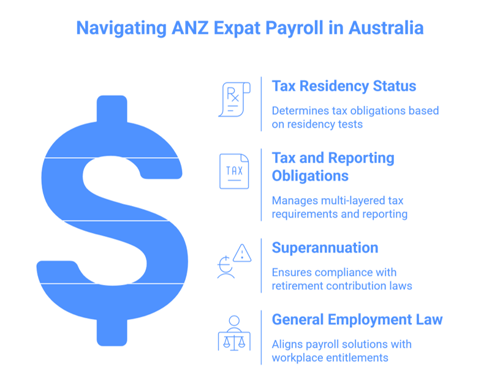Payroll is the invisible engine of global growth. Every strategy, every market entry, and every cross-border hire ultimately relies on one thing: getting people paid accurately, compliantly, and on time. As ANZ businesses set their sights to expand beyond the shores, ANZ expat payroll can no longer be a back-office function. It must evolve into the very foundation on which global ambitions are built and succeed.
And the momentum is clear. A recent survey found that 89% of Australian mid-sized companies plan to hire overseas talent in 2025, motivated by 41% citing closing local skill gaps, 44% expanding customer reach, and 43% increasing productivity through follow-the-sun teams.
When opportunities scale, diversify, and innovate, it brings along a new reality where talent is global, and companies are competing for the best minds across geographies. Expats, employees who live and work outside their home country, are at the heart of this shift, bridging local operations with global ambitions. Unlike local employees, expats live at the intersection of multiple tax codes, social security systems, benefits structures, and currencies.
This foundational understanding of ANZ expat payroll assembly paves the way for a deeper exploration into how these components can be leveraged as a strategic advantage for ANZ businesses.
Why ANZ Expat Payroll Is More Complex Than Domestic Payroll
Unlike domestic operations, ANZ expat payroll services must navigate a maze of cross-border obligations, such as:
- Multi-jurisdiction taxation & compliance - Different tax rules across countries make payroll tax calculations complex and time-consuming. Businesses must ensure compliance in each jurisdiction, often requiring specialized expertise to avoid costly penalties.
- Social security & pension obligations - Varying contribution frameworks across regions increase the reconciliation workload for payroll services teams. Failure to manage these obligations accurately can expose organizations to compliance risks and employee dissatisfaction.
- Benefits and allowance disparities - Expat packages often include housing, education, and hardship allowances, which differ significantly by geography. Without standardized payroll systems, inconsistencies can arise, leading to inequity and employee frustration.
- Currency fluctuations & FX management - Volatile exchange rates make it difficult to ensure accurate and timely payments for expats. Leveraging global payroll solutions with built-in FX management helps businesses minimize risk and improve predictability.
- Fragmented payroll systems — When payroll software and data are spread across multiple platforms, delays and errors multiply. An integrated approach streamlines operations, improves accuracy, and provides greater visibility across global teams.
The Cost of Getting ANZ Expat Payroll Wrong
Understanding the complexities of global payroll is just one side of the coin; the other is knowing the real cost of getting ANZ expat payroll wrong, which entails:
- Financial Penalties & Regulatory Risks- Late or inaccurate payments are costly. For instance, in New South Wales, payroll tax late payments attract a 25% penalty on unpaid amounts, compounding fines for poor compliance. Cross-border audits further increase the risks.
- Administrative Inefficiencies & Workload- Disjointed payroll outsourcing frameworks increase overheads significantly when managing multi-country expat payroll systems.
- Compliance Errors Amplified - According to the Global Payroll Management Institute, 70% of companies cite compliance as their primary obstacle in managing international payroll solutions. For expats, the complexity is magnified, and missteps can damage credibility across global operations.
- Employee Experience at Risk - Nothing erodes trust faster than late or inaccurate payroll services. Mismanagement of allowances such as housing or education can directly impact retention, making employee experience a high-stakes factor in global operations.
Managing ANZ Expat Payroll in Australia: A Strategic Guide for Global Enterprises
Payroll for expatriate employees in Australia involves navigating both Australian tax and employment laws, as well as potential obligations in the employee's home country. For enterprises, this complexity underscores the importance of investing in the right ANZ expat payroll systems, payroll services, and technology-driven payroll solutions that can ensure accuracy, compliance, and a seamless employee experience.
Below is a breakdown of the key considerations that global companies should keep in mind when managing ANZ expat payroll outsourcing in Australia.

1. Determining the Employee’s Tax Residency Status
Tax residency is the foundation of expat payroll systems, as it dictates tax obligations for both employer and employee.
The Australian Taxation Office (ATO) applies four tests to establish residency:
- Resides Test – Based on lifestyle, family ties, and physical presence.
- Domicile Test – Permanent legal home in Australia, even if living abroad temporarily.
- 183-Day Test – Presence in Australia for over 183 days in a financial year.
- Commonwealth Superannuation Test – Applies to certain government employees.
Impact on Payroll Services:
- Australian Tax Resident – Taxed on worldwide income. Employers must withhold PAYG tax, report earnings through Single Touch Payroll (STP), and make superannuation contributions.
- Foreign Tax Resident – Taxed only on Australian income, generally at a higher flat rate, with employers still responsible for PAYG and reporting obligations.
2. Understanding Tax and Reporting Obligations
For expat employees, payroll outsourcing partners or in-house teams must manage multi-layered tax requirements:
- PAYG Withholding – Employers must calculate and remit income tax, which varies by residency status.
- Single Touch Payroll (STP) – A mandatory reporting system that requires real-time reporting of wages, PAYG, and superannuation through integrated payroll software.
- Double Taxation Agreements (DTAs) – Prevent double taxation but require careful handling by global payroll services providers to ensure correct offsets.
- Payroll Tax – State-based and applicable where expats work in Australia. Long-term overseas assignments may qualify for exemptions.
- Fringe Benefits Tax (FBT) – Housing, school fees, and other non-cash benefits provided to expats may trigger additional obligations.
3. Superannuation (Retirement Contributions)
Expats remain entitled to superannuation under the Superannuation Guarantee (SG). For employers, compliance requires robust payroll systems that can integrate with social security agreements and manage cross-border contributions effectively.
4. General Employment Law
Expat employees in Australia fall under the same workplace entitlements as locals under the Fair Work Act. Ensuring that payroll solutions align with these entitlements, covering wages, leave, and maximum hours, is key to both compliance and the employee experience.
Smart Strategies to Get ANZ Expat Payroll Right
Payroll complexity does not have to translate into confusion. ANZ businesses can turn ANZ expat payroll systems into a reliable foundation for compliance, accuracy, and employee trust with the right combination of:
- Centralizing Compliance & Visibility- Build a single source of truth for all payroll systems. Cloud-based payroll software integrated with HR and finance provides real-time compliance monitoring, easing payroll outsourcing coordination.
- Standardizing Benefits Frameworks - Develop a global framework for benefits while allowing local flexibility. This avoids mismatches in allowances and ensures equitable treatment across markets.
- Leveraging Technology for Accuracy & Agility - Harnessing the right technology can transform ANZ expat payroll systems from error-prone to future-ready. Automated reconciliation minimizes manual mistakes, while AI-powered tax calculators ensure multi-jurisdiction compliance with ease. Predictive analytics help anticipate FX volatility and potential penalties, and real-time dashboards with self-service portals give employees transparency and control, enhancing both accuracy and employee experience. Moreover, self-service portals improve employee experience by offering access to payslips, allowances, and real-time updates.
- Strengthening Regional Partnerships - Blend local expertise with centralized global payroll systems. Working with in-country payroll services and tax advisors ensures compliance while maintaining efficiency.
- Managing Financial Risks - Deploy transparent FX policies, consistent conversion protocols, and hedging mechanisms. A strong payroll outsourcing partner can help mitigate volatility risks effectively.
- Prioritizing Employee Experience - Timely, accurate, and transparent payments build trust. Clear communication of policies and payroll software-enabled self-service options make expat life easier, reducing attrition.
Conclusion: From Compliance Burden to Strategic Enabler
Managing ANZ expat payroll extends far beyond payments; it means navigating diverse tax systems, ensuring transparency in benefits, and building confidence across global teams. The businesses that thrive are those that treat payroll as a lever for trust, compliance, and growth. With the right payroll systems in place, organizations can transform payroll from a reactive task into a proactive enabler of expansion.
This is where Ramco supports enterprises with clarity and scale. Its unified global payroll solution brings automation, AI-driven compliance, and integration across HR and finance, simplifying multi-country operations while ensuring agility and accuracy. Built for the realities of a borderless workforce, the payroll solution delivers global consistency with local compliance across 150+ countries. Recognized by leading analysts and industry bodies, including Gartner, Forrester, NelsonHall, GPA, and Frost & Sullivan, Ramco is trusted by global enterprises to run payroll that is accurate, efficient, and future-ready.
The true test of global expansion goes beyond winning new markets. It is in sustaining them with systems that inspire trust and deliver consistency.





